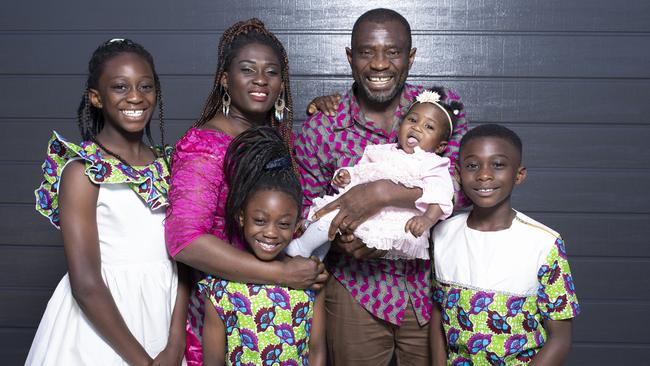
John Kamara has fond memories of his early childhood, growing up in a remote village in the West African nation of Sierra Leone.
Kamara was the youngest of six children, and was doted on by his parents, his grandparents and his five sisters.
“The girls loved and adored me so much,’’ he says.
Kamara attended the village school and on evenings, weekends and school holidays he remembers walking 10km to his family’s farm, where he would play in the bush with his siblings and help collect firewood while his dad farmed cassava. They would then walk the 10km home, carrying the firewood they had collected, which was later given to his mother to put on the campfire burning outside the family’s hut.
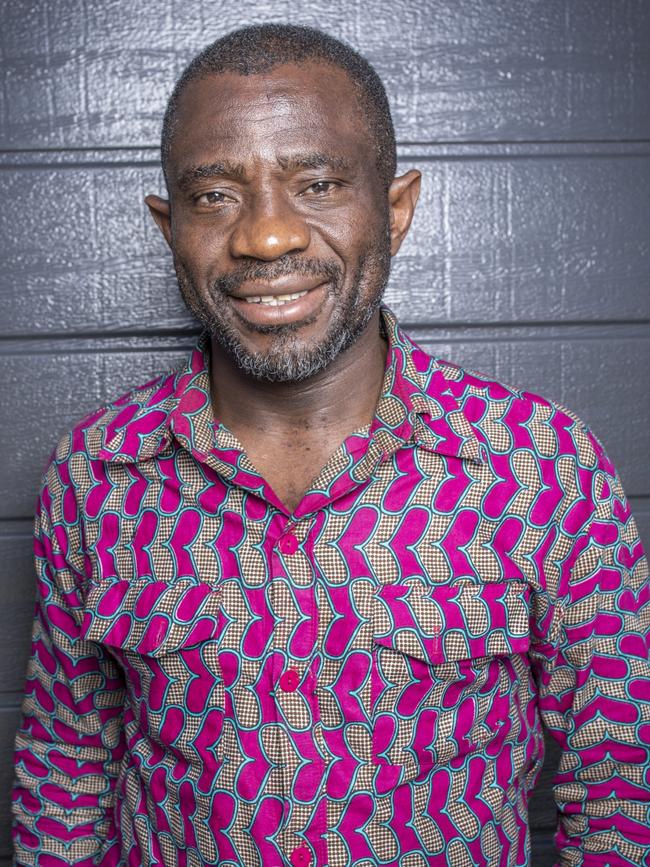
He recalls sitting around that fire, hearing stories about his ancestors from his elders, while also learning essential skills for village life, such as basic first aid and how to prepare food.
“I really cherish those memories of my family,’’ Kamara says.
But his world was brutally ripped apart when civil war erupted and rebels came to his village, capturing the youngster and killing his father.
“Growing up, around 10 or maybe 11, the war broke out and my life changed,’’ Kamara says.
Villagers had heard rumours of war and had been listening closely to news updates on a small radio in the centre of the village.
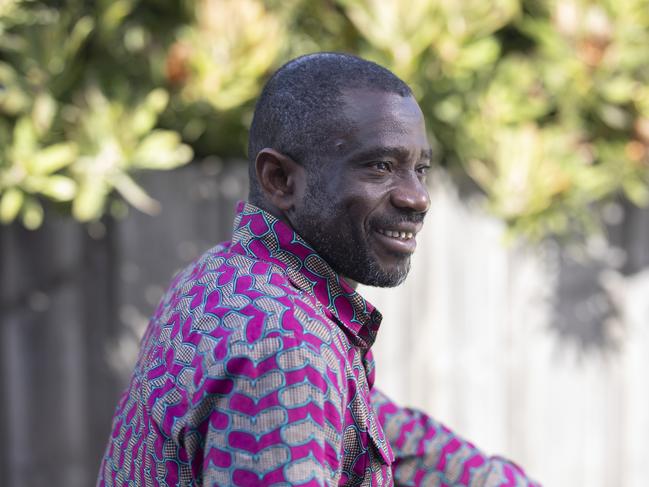
They had hoped their remote location would keep them safe. But, sadly, they were wrong.
“Eventually the war got to us,’’ Kamara says.
“We heard it coming, coming, coming and then it got to us. So we had to flee for our lives.
“With war, you don’t expect it, it just happens.”
Kamara and his extended family members were of particular interest to the resurgents.
“My dad was a local chief, so the rebels targeted my dad because they thought he was part of the government,’’ he says.
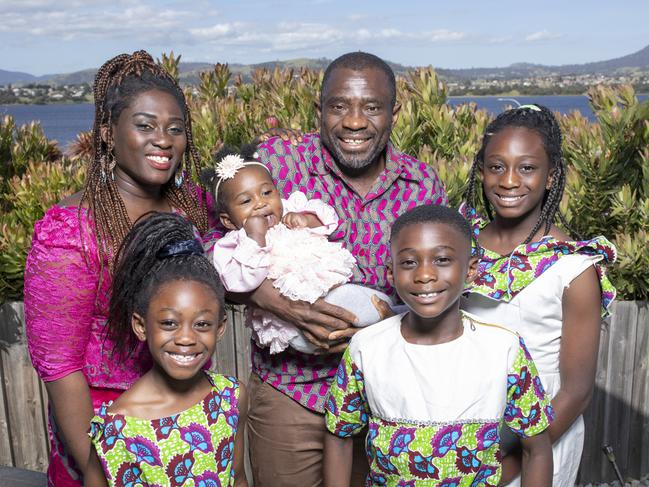
“As a local chief, you settle disputes among the villagers, you go to functions, like naming ceremonies to name a child, and people come to you to seek advice. So when the rebels came, he was a target.
“I was in my sister’s hut on the day the rebels came, with one of my sisters and her husband.
“They captured me and my brother-in-law, and took us away in a truck, and they took my sister in a separate car.’’
Kamara’s young life could easily have been cut short on that fateful day, but luck – and some clever thinking by his brother-in-law – ensured they survived to tell the tale, with Kamara eventually settling in Tasmania, where the now 38-year-old has lived for the past 19 years.
When the rebels were distracted, Kamara’s brother-in-law realised it was the perfect opportunity for them to attempt an escape and together they managed to sneak out of the truck and fled to the coast.
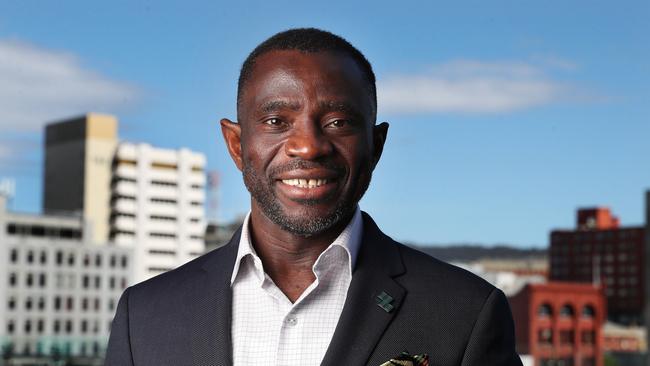
“We knew we couldn’t stay (in Sierra Leone), it wasn’t safe, we had to go,’’ he says.
“Our town was close to the sea. Everybody was running to the sea to catch a boat to go to the next country.
“It was so scary as a young boy, we were in this small boat, and over 200 people had to get into it to cross the sea to go to the next country.
“My brother-in-law, because he was very strong, he got me into the boat.
“We were on the sea the whole night, the boat had a very little engine, it was a terrifying and very risky journey... which many did not survive. But finally we got to the neighbouring country [Guinea].
“We were running for our lives”.
Kamara’s brother-in-law had heard about a refugee camp in Ghana, so that is where they headed.
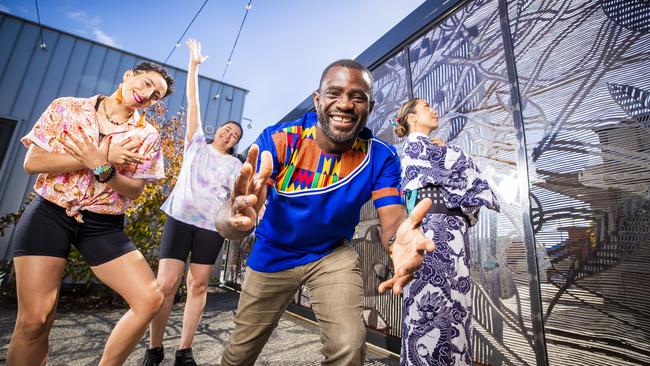
That journey, which involved a lot of walking, as well hitching rides on trucks and staying at various places along the way, took them almost a year.
To put it into context, Kamara says the distance they covered is about the same distance from Tasmania to Queensland.
“I was so amazed, as a young boy, to be going through that,’’ he says.
“Eventually we got to Ghana and a miracle happened. We got to the refugee camp and my sister was there – my brother-in-law’s wife.
“She was very sick, and nearly died after ill treatment by the rebels. But we got reunited, and what a moment – it was a magic moment.’’
While living with his sister and brother-in-law at the camp, which was situated in thick forest, Kamara recalls there were some “really wild animals” and he saw “the biggest snake of my life”.
He also secured a scholarship which enabled him to attend a local school.
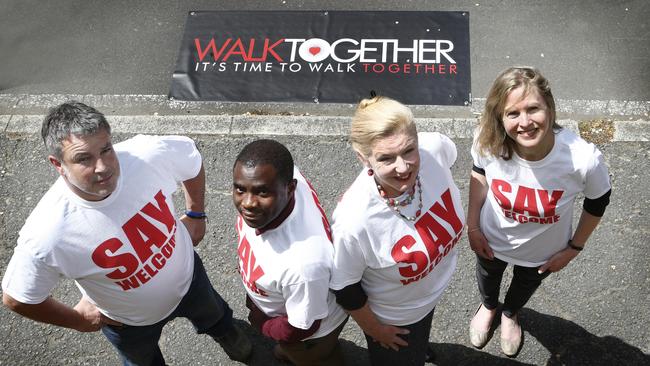
And it was here he befriended a local girl, Mavis, who – years later – became his wife.
“We spent about four years in Ghana,’’ Kamara says.
“I was fortunate to get a United Nations scholarship so I could get an education and I went to one of the local schools, and that’s where I met Mavis.
“I think I was around 14 or 15 years old at the time, she was a student at the school. Mavis was not a refugee – she’s a Ghanaian – and she looked after me, supported my education and we became friends.’’
Meanwhile, Kamara, his sister and his brother-in-law were offered places in a resettlement program, as it was deemed unsafe for them to return to Sierra Leone.
“We heard America, Australia and England – all those western countries were resettling people in our situation,’’ he says.
Kamara arrived in Australia on his own, in 2004, a few months before his sister. He was a wide-eyed 19-year-old, with limited English, settling in Launceston, a city so different to anything he had ever known.
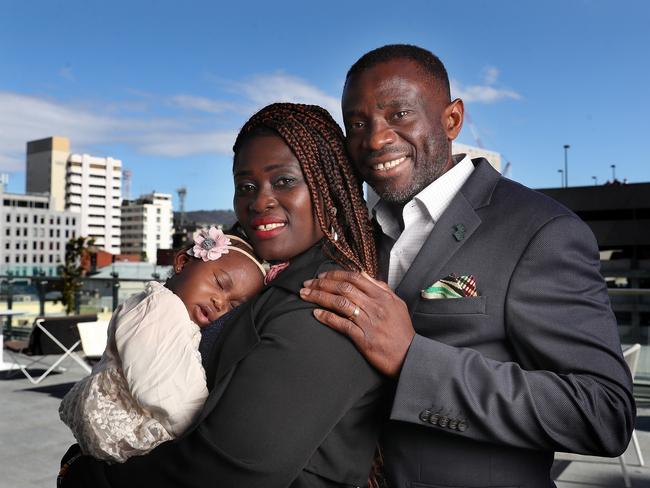
He faced many challenges – and plenty of racism – and those struggles have led him to where he is today, working to help other migrants and refugees have a better experience as they settle in Tasmania.
His tireless work with various community organisations was recognised at an awards ceremony in Hobart last month, where he was named Tasmania’s Australian of the Year for 2023. Kamara will now represent Tasmania at the national Australian of The Year Awards in Canberra next month.
Back when he arrived in Tasmania, the state had few African migrants and he says some people in Ravenswood were wary of their new dark-skinned neighbour and some were openly hostile.
“People didn’t understand this black man, they hadn’t seen much of black people,” Kamara says.
He says arriving in a new place was far more difficult than he could have imagined.
“The challenges in this new world were really a surprise to me,’’ Kamara says.
“People were speaking to me and I couldn’t hear their English. The food was so different, the music was so different, the sounds and the smells were so different.
“While I had escaped from war and guns and weapons and all that, in Tasmania I found that there was a different struggle. There were massive unknowns, so much uncertainty. Basic things like catching the bus, making friends – I had to relearn everything about living again, everything about daily life.
“So it was a whole new challenge for me.
“I’m in Tasmania and I’m faced with a new world that I know nothing about.’’
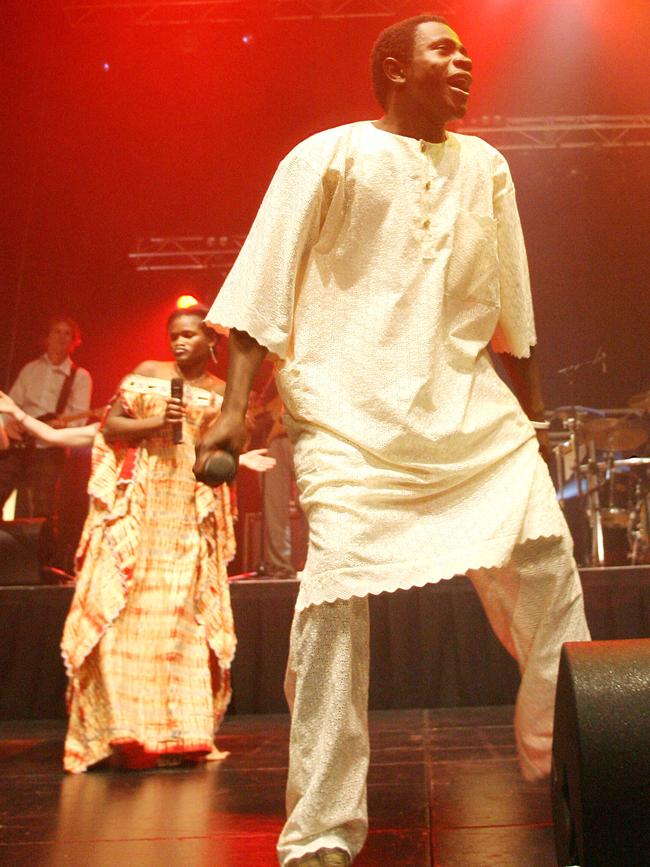
His sister and brother-in-law arrived in Launceston about six months later and Kamara found life easier with their support.
Despite the challenges, he completed his first university degree, a bachelor of arts majoring in international relations and sociology. Most people would find a university degree challenging enough, without the added pressures of studying in a foreign land, in a language that was not their native tongue.
“I completed my first degree in 2008 and that was a struggle for me,’’ he says.
“It took me four years instead of three.’’
Throughout this period he also worked for the Migrant Resource Centre in Launceston, where he was busy running programs to support young refugees resettling in Tasmania.
He tapped into the joy and creativity that sport and music could bring as a means of overcoming trauma and creating community. He organised soccer teams, started a choir and a drama group and talked to social workers in schools about how to support those young people. He also taught young migrants about the justice system and advocated for them with police to build a mutual understanding.
At the end of his degree, Kamara applied for permanent work.
“I applied for work in Adelaide, and in Hobart, and in Launceston,’’ Kamara recalls of that time.
“And I got the job in Launceston and I got the job in Adelaide, and I got the job in Hobart.’’
He opted to move to Hobart, where he started work with the Department of Communities, where he has worked ever since.
Kamara returned to Ghana to visit Mavis and they married.
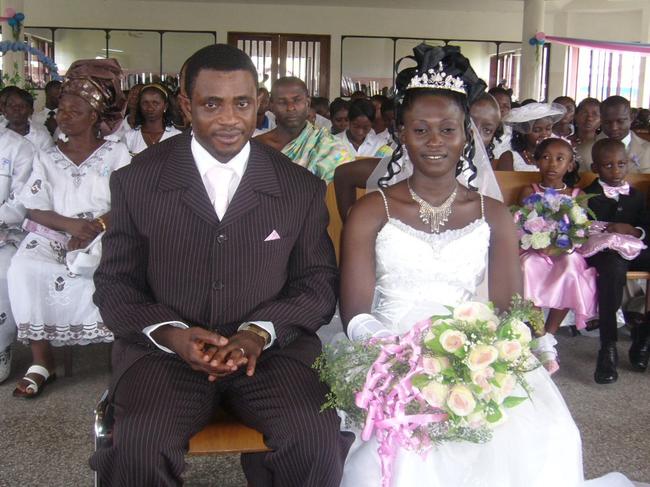
The pair had gone to a lot of effort to stay in touch, despite being on opposite sides of the globe, at a time when technology was still in its infancy.
“We stayed in touch but it was hard and it cost a lot of money,’’ Kamara says.
“At that time there was no technology, like WhatsApp or Snapchat and everything there is now. I would go to internet cafes to send emails, and Mavis would do the same thing.
“Or sometimes I would send emails from university.’’
He returned to Australia without his new wife, and applied for her to be able to join him.
A year later and Mavis was finally on her way to Tasmania, a place they still proudly call home.
Kamara has since become involved with various community organisations – he is a co-founder and president of the Culturally Diverse Alliance of Tasmania, a founder of the African Communities Council of Tasmania, a board member for the Tasmanian African Community Forum and secretary of the Sierra Leone Association of Tasmania, to name a few.
Kamara says his own struggles inspired him to help others.
“Going through that, the experience I had, just made me want to help people,’’ he says.
“Because I have the lived experience, and the challenges I faced, it gives me that drive to do something so that the next person might not face those challenges. To make it better for them than it was for me.
“It makes me feel good, it has given me a sense of purpose, knowing I can help make a difference in the community.’’
He is also motivated to make the world a better, more culturally aware place for his four young children.
Kamara is a doting dad to three daughters – Jonievis, 11, Jonavia, 6, and Joneva, 7 months, and a son, John Jr, who is 9. They live in a home at Granton that they built six years ago and Kamara credits his wife for making him the man he is today.
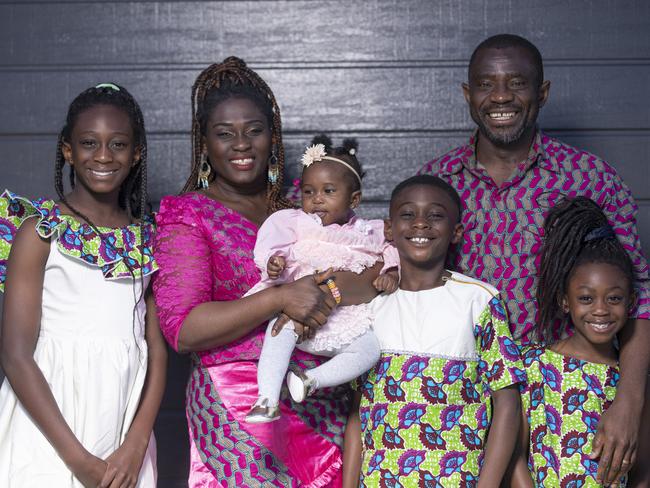
“I am a family person and I love being a dad,’’ he says.
“I love being a husband to Mavis, she’s my rock, she makes me what I am. Because Mavis is a family person, she taught me – growing up I didn’t have that, I missed that. She shaped me to be what I am today. I love being a dad, I love being a man in the home, just doing my part and supporting my family.’’
He says his children have such a different life in Tasmania compared to his own childhood in Sierra Leone.
“That’s why I’m trying to give them so much that I didn’t have,’’ he says.
“Like taking them to sport – basketball, soccer, gymnastics, swimming – they’re so busy. As parents, Mavis and I work so hard to just give them the best life that they can have.’’
A trip back to Sierra Leone in 2019 inspired Kamara and his wife to start their own charity, Kamara’s Heart Foundation, to help children less fortunate than their own.
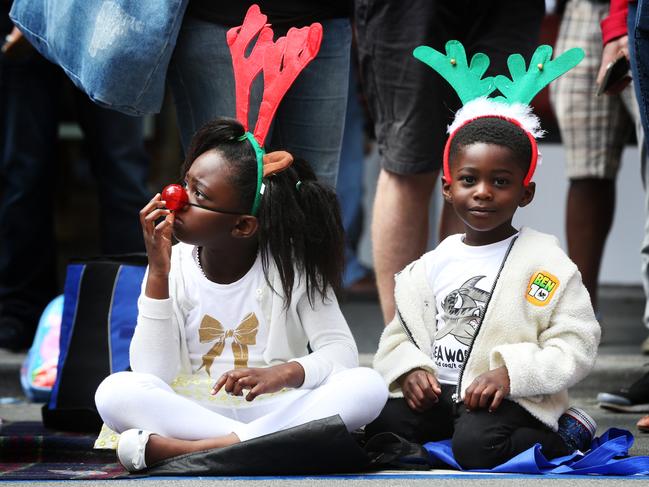
“I went back home to Sierra Leone,’’ Kamara says.
“And it was a shock for me to see how the children lived. My kids here, they have all they need in terms of their education – they have breakfast, they have lunches, they have books, uniforms and toilet facilities. In Sierra Leone the kids don’t have these things. And there are kids there, who have lost their parents to ebola, these kids are orphans. It broke my heart. I was retraumatised, I wanted to do something to help, which is why we started Kamara’s Heart Foundation.’’
Kamara says the organisation’s aim is to “provide better educational outcomes for children who are vulnerable, who don’t have parents, who can’t get enrolment fees”.
The organisation trains teachers and pays them to teach. Funds are also being used to build school toilets and to provide sanitary products for girls. Sewing machines have been provided to enable school uniforms to be made, while also enabling students to learn valuable sewing skills.
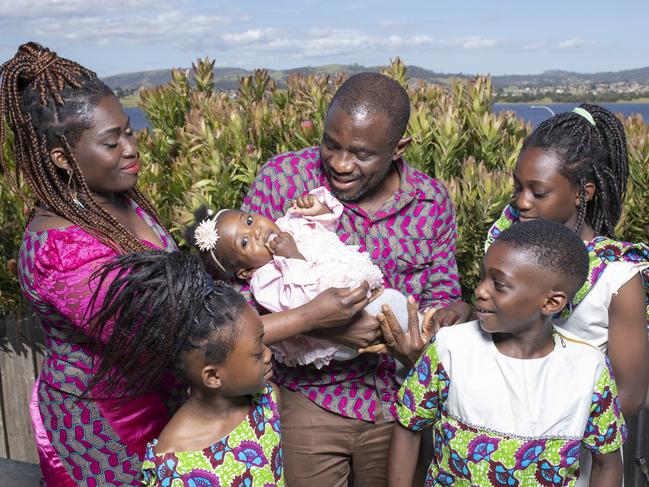
The organisation also helps the migrant community in Hobart, assisting people with tasks such as writing resumes, preparing for job interviews, completing housing applications and connecting with agencies like Centrelink and the Australian Taxation Office.
Mavis often cooks up a big batch of food for the community. Some families come to their home to collect the food, while in other cases Kamara drives around and drops off the free food parcels.
Kamara says when the African Communities Council of Tasmania was established just over a decade ago, there were about 3000 Africans living in Hobart.
Despite this, he says there are so many ways that migrants and refugees are not being well supported and their needs are not being adequately addressed. Which is why he has made it his mission to highlight the systemic disadvantages they face upon arrival in the state.
Kamara says many migrants are highly skilled, but their skills are not being fully utilised or recognised. Despite racism being far less prevalent than when Kamara first arrived in Tasmania, he says it is still a problem.
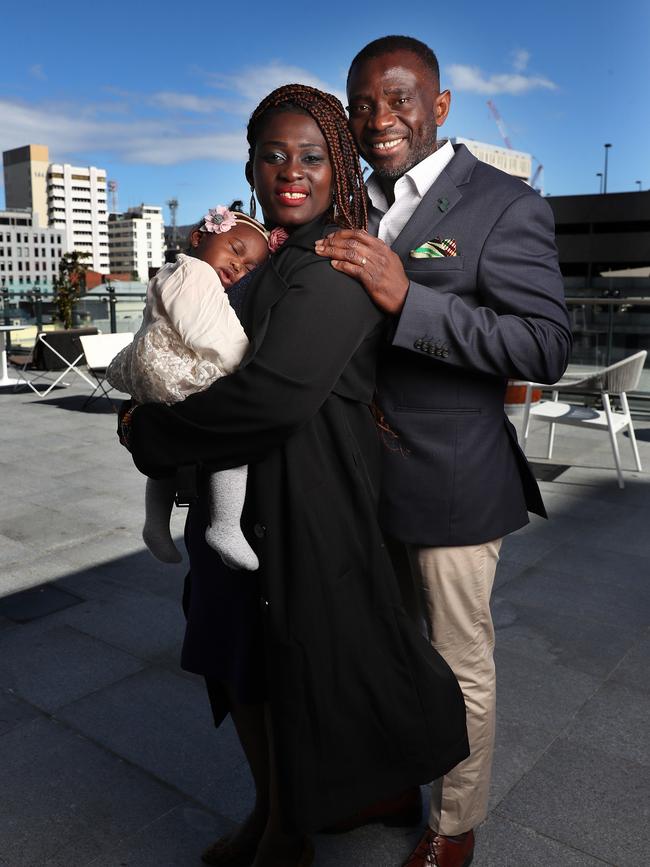
He says there are still people who think that because someone cannot speak English well, they are less worthy of a fair go.
He says racism is still practised in “subtle” and “covert” ways. Exploitation of labour is an ongoing problem. Many migrants are also struggling with the rising cost of living. And poor mental health is also a concern, as many migrants are lonely and far from their families. Like Kamara, many have not seen their loved ones for many years and, in many cases, do not even know if their loved ones are alive.
Kamara has not seen his mum since he was 11. He discovered about 12 years ago, through a friend who knew the Kamaras in Sierra Leone, that his mother was still alive. She currently lives with one of her daughters, who also has a child of her own, but is “very frail’’.
Kamara would love to bring his mother to Tasmania, but is aware of the barriers around obtaining visas for family members.
“Immigration will not let me bring her,’’ he says. “I have to prove that she’s my mum.’’
But he says that is difficult when families are so displaced by war – he fled his own country at the age of 11, without any paperwork.
In addition to his sister in Launceston, another of Kamara’s sisters now lives in Brisbane. Two of his sisters remain unaccounted for, presumed dead. And it is a similar story for many other refugees.
“It’s hard, not knowing,’’ Kamara says.
“This is what we go through every day.’’
Such struggles make him even prouder to be named Tasmanian Australian of the Year.
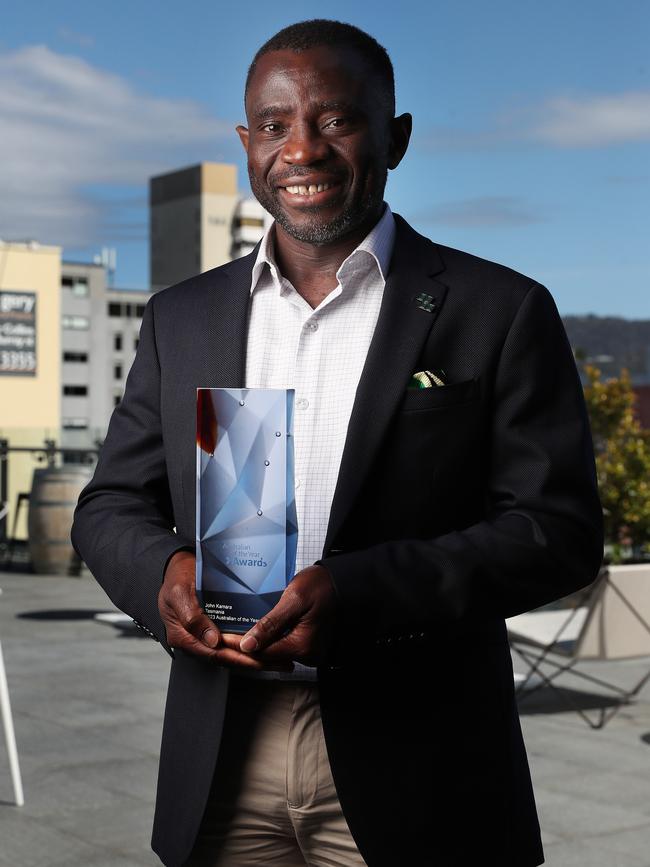
He felt “really humbled” and “honoured” to receive the award.
“It makes me feel valued for the work I do in the community and the appreciation that the community has for the work I do,” he says.
“It makes me feel really blessed.
“My lived experience ... motivates me to lead and just know that I can use my experience in making some change and making some difference so that the other person might not go through what I have gone through.’’
He says Tasmania is a place he feels “safe and secure”. He wants other migrants and refugees to feel that same sense of belonging.
“I didn’t have a choice at the time, the Department of Immigration made the choice to bring me to Tasmania,’’ he says.
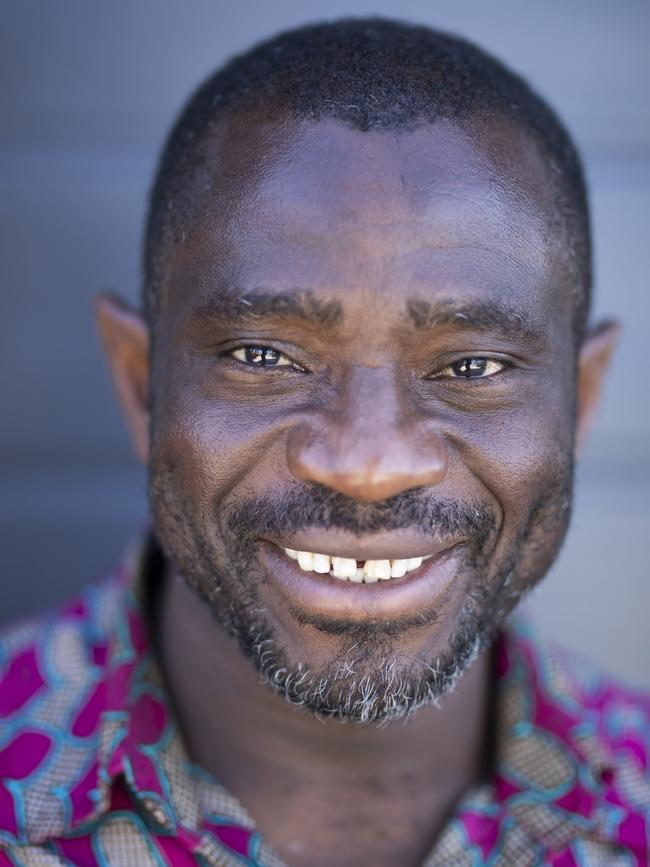
“But that’s the best choice, I think that’s the right choice, it’s so good to be in Tassie.’’
Although he admits he wasn’t impressed with the cold weather at first.
“The very first time I stepped out of the plane, I had to run back into the plane because it was so cold outside,’’ he says, laughing.
“But I love it here. I have travelled to bigger cities in Australia but I always come back home, Tassie is a home away from home and I’m so grateful for the opportunities and for everything Tasmania has given me.
“Although there has been some hurt along the way, Tasmanians are lovely people and I have found friends and allies and neighbours –and a powerful sense of purpose. And that’s what keeps me going.’’•
John Kamara is one of four Tasmanians who will represent the state at the national Australian of the Year Awards in Canberra on January 25. He will be joined by Tasmanian Senior Australian of the Year Dr Frances Donaldson, Tasmanian Young Australian of the Year Meriem Daoui and Tasmanian Australia’s Local Hero, Keith Parker. australianoftheyear.org.au

Run clubs: Tassie’s booming fitness trend
It’s sweaty, social, slightly culty and the new way to find friends, fitness and love. Find out why a growing number of Tasmanians have swapped beer goggles for sneakers as running clubs boom
Overcoming adversity to achieve Tassie zoo dreams
Stuart Webster frequented Melbourne Zoo as a child and dreamt of owning a zoo. After battling addiction and adversity his childhood fantasy came true in Tassie. He’s got lofty future plans